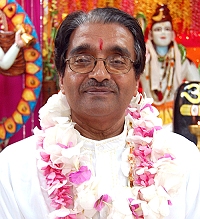Paramacharya of SWAHA, Pundit Hardeo Persad
From SWAHA Viewpoint on ieTV on the issue of the many Venezuelan migrants who have lived among us since 2019 and the recent stories of the deportation of Venezuelan nationals and their children. How do we treat with them, not just as citizens, but for those who have to deal with them from a policy perspective, as well as from a human perspective and a Hindu perspective?
It is a multidimensional issue. First, there are international conventions that guide us. People seek refuge in a country because of the conditions in their home country. The international conventions and the laws of the land insist that we open up our borders to a certain number of people, based upon our circumstances. Our country’s leaders are aware of how this influx of migrants will affect our country, whether positively or negatively.
From a humanitarian standpoint, Hinduism says Atithi Devo Bhava, The guest is treated as God. However, this must also be placed within context, as some might say, there could also be the uninvited guest. The decision must be based upon our circumstances. These people need our help and we must treat them as best as possible, with hospitality and respect. However, we can only make concessions up to a certain point based on our own situation as a country.
Sometimes, people run away from their homeland because they can no longer live there because of destitution. They did not come for a holiday and decide to stay. They were seeking refuge. We must treat them with dayaa (compassion) and daan (charity), two of the four principles of Sanatan Dharma. However, charity does not only refer to giving material things. The Venezuelan nationals arrived in our country seeking employment. Many are exploited; there are unscrupulous employers who wish to make a big profit, so they will exploit these people. Instead, perhaps we as a people can learn from them, from their forbearance and determination. Some of them are very qualified professionals who get jobs doing manual labour. They make that sacrifice in order to survive. However, they are also contributing to the economy. Many business owners commend them for their work ethic. There have been many Trinidadians who migrated to the U.S. and they have the same positive attitude towards work as the Venezuelan nationals who live in Trinidad.
We must analyze where we are as a people. In the past, people from India and Africa migrated to our country through slavery and indentureship. Those places had their own unique races but today the world is a melting pot; people are mixing and different cultures, races and religions are spreading to every part of the world. This intermixture of cultures will bring about a dynamic change in world culture. Man has evolved over time because of such a mixture. We must also look at this in terms of karma. I did not choose to be here but my karma dictates that I should be here. To my mind, it is a divine plan.
If people have to be deported, it should be done in a humanitarian fashion. Even if by law we are right, we must treat them with compassion and with love. Worldwide, people must always show respect and regard for children and the aged, as stated in the Ramayan. The young are the future and we must teach them the right values; the aged have built this society and we owe our gratitude to them.

